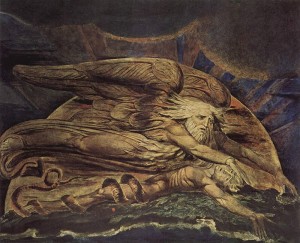by Fr. John A. Hardon, S.J.
Part One : Chapter IV :: Grace to Adam

“So God created man in his own image, in the image of God he created him; male and female he created them.” (Genesis 1:27)
Deiform Man. What graces were given to Adam in the state of original justice? The array of graces that made him supernatural man: the Indwelling Trinity – sanctifying grace – infused virtues – gifts of the Holy Spirit. What kind of man may we now call him? Sanctified, divinized, deified – but the term we like best, the one which many Fathers and St. Thomas have used, is deiform. Adam was God-like; two complementary “natures” were united, interwoven, into one deiform man. Adam was not God; he was not made ever into God. But he was made god-like, a deiform man, lifted up as it were into the realm of God. And it was sanctifying grace that gave him this deiform nature, infused virtues and the gifts of the Holy Spirit that gave him his deiform powers, the Indwelling Trinity that caused and conserved all these graces in him.
We find in him also certain preternatural gifts: integrity, impassibility, immortality, infused knowledge. We call these graces, too. But while the graces mentioned above (sanctifying grace, etc.) are absolutely supernatural, since they are not due to any created nature, the preternatural gifts are relatively supernatural (supernatural relatively to human nature) since they are undue to human nature, but are due to angelic nature.
Integrated Man. The gift of integrity effected a harmonious relation between flesh and spirit in Adam, by completely subordinating his animal passions to his reason. There was no precipitous pull of passion before or against reason. This gift that put harmony and order in Adam (and Eve) gave him another likeness to God, Who is perfect Order. With such perfect order and control it is hard to understand how Adam could sin. Yet we must remember that he was free, and freedom is a tremendous power – to say NO to God.
By these preternatural gifts in Adam, he became something that we are not, even when we are baptized. He became an integrated man. Human nature is not perfect in itself, and is certainly not the perfect thing that some would have us believe. If man had been created with natural endowments alone (pure nature), there would still have been the seeds of conflict within him. For in man, God has done the seemingly impossible: He has combined “incompatibles,” matter and spirit. The body goes quickly to the things of sense; the mind goes more slowly to things of the spirit. Thus, there are roots of disorder in man’s very nature. St. Paul spoke so eloquently of this battle, this conflict in man (Rom. 7). In Adam, God did not remove the disorderly tendencies, but by the gift of integrity He put in him a principle of control.
Adam likewise had, of course, natural endowments of body, mind, and a will which was free. His nature was like ours, but probably very much better.
Original Plan. What was God’s “original” plan with regard to men? All these gifts to Adam were intended for the human race. We, too, would have been born with the whole line of supernatural gifts, as well as with the preternatural gifts. (The gift of infused knowledge is disputed – perhaps it would have been given only to Adam, who was made “adult” and as King of Creation needed it – to know and name the animals, plants, etc.). We would have been in sanctifying grace, but not confirmed in it; we would have been free to sin and might have sinned. But we, too, would have been: deiform and integrated human beings.
The Fall. What intervened to disrupt God’s plan? Sin, the sin of Adam. And was it a grave sin? Yes. The consequences for Adam were loss of the supernatural gifts (except faith and hope??) and of the preternatural gifts: he became subject to concupiscence, pain, suffering and death of the body. And hell – eternal “death” of the soul – would be his lot unless God would show special mercy. For us the consequences were the same.
Many struggled with this question of original sin. One of these was Pelagius, born either in England or Ireland. He later went to Rome. As spiritual director there, he heard people complaining in discouragement that they were unable to keep from sin, through lack of grace. From his own disturbance he emerged with an amazing answer: there is nothing wrong with human nature, no such weakness in it. Man is a moral superman, strong and independent, full master of his destiny: he can do anything, avoid every sin, do any good, even gain the Beatific Vision – without grace. Adam had no grace, lost none for us; in fact he never fell. There was no fall, there is no original sin and hence no need of grace or baptism to remit this sin.
St. Augustine of Hippo struck out fiercely against this, and wrote out boldly: Nature can do nothing without grace. The controversy was on – with some monks in Africa, who felt Augustine had gone too far. St. Augustine clarified his position: nature can do nothing salutary, nothing conducive to salvation, without grace. But can human nature do all things natural to it – can it keep the whole moral law – without grace? We answer with St. Thomas and the Church: for a short time, yes; but for a long time, no.
The Fall, then, was devastating. And its extent? Is there complete darkness of mind? Complete loss of freedom? Is man a slave to his passions? Is he depraved? Is his nature corrupted? Luther and Calvin said, Yes. But the Church says, No: man is only deprived – of superadded gifts. The Fall wrought great harm: man lost those supernatural and preternatural gifts, but not free will. Without grace man can still know God and other speculative and moral truths, and can do naturally good acts. But he cannot keep the whole natural law, without grace, for a long time. He is not corrupted or depraved; he is deprived of supernatural and preternatural gifts.
God has not made man too strong in himself. As if perhaps to say: “I made angels strong, and many of them did not need Me. I will make man to lean on Me.” So it is God’s part to give grace, and man’s to pray for it and use it. Prayer is man’s expression of his need, salutary prayer; grace is God’s answer to man’s need expressed in salutary prayer.
Orginal Sin. Man in the state of original sin lacks sanctifying grace, and this is not mere absence; it is a privation. Something is not there in the soul which should be there. Moreover, there is the habitual inordinate tendency of the sense appetite, the proneness to inordinate appetition that we call concupiscence.
If God had washed His hands of man, so to speak, and left him alone, what would have happened to him? All those dying as infants would have gone to Limbo, it seems. All adults would have gone to hell, since without grace they could not long keep the entire natural law, could not long keep out of mortal sin. So if they lived long enough they would sin, die in sin and go to hell. Would there be anything contrary to justice in this? No. God could have left man thus; but we say He would not, and He did not.
The Promise. God promised man a Redeemer. This was a serious, operative promise – that would be infallibly fulfilled. And something happened immediately. Grace flowed again into the world as soon as God made that Promise – in virtue of the foreseen merits of the Redeemer. “I will put enmity between thee and the Woman, between her seed and your seed” – these were not empty words. God acted. Instantly a whole new providence, so to speak, comes into play.
God’s providence is amazing, infallible, inscrutable, reaching from end to end mightily, ordering all things smoothly. Now grace was given to Adam in view of the merits of Christ. Adam is no longer King and Center, and Eve is no longer Queen. Christ is the King of the New Order; Our Lady replaces Eve as its Queen.
Is the “second providence” greater than the first? It seems so. The Church in her liturgy sings, “O felix culpa.” Man is now centered in someone else than Adam: in Christ, the God-Man, King of angels and men. All creation is turned to this new Center. Angels apparently had the first and greatest place. Yet it seems that God loved man more than the angels. When man sinned, God sent God in the form of man so that what man had undone, Man would restore. And Our Lady? She is Woman. Again and again the bond between the New Testament and the Old seems reiterated when Our Lord speaks to Our Lady as Mulier, “Woman,” with no further qualification. “Woman, what is that to Me and to thee?” “Woman, behold thy son.” We feel carried back to the promise in the Garden, “I will put enmity between thee and the Woman.” Who else was the Woman of the Garden – but Our Lady, the Second Eve?
Who received the first grace after the Fall? Adam, it seems to us, then Eve. This first grace might well have been an actual grace of repentance. Did this grace flow, so to speak, from precisely the same source as before? No; before Adam sinned he had the grace of God; after he sinned he had the grace of Christ, that is, grace dependent on the merits of Christ, the Redeemer, Who would surely come and redeem.
